If you’re aiming for the best premium graphics cards in 2025, I recommend checking out options like the MSI GeForce RTX 3060 12GB and ASUS TUF Gaming GeForce RTX 5070 Ti 16GB for top-tier power and performance. GIGABYTE’s Gaming OC and Radeon RX 580 models also offer excellent value for high-end gaming. To make the right choice, consider factors like VRAM, cooling, system compatibility, and future-proofing—stay tuned to discover more detailed insights.
Key Takeaways
- Premium graphics cards in 2025 feature high VRAM (16GB or more) for future-proof gaming and demanding workloads.
- Top-tier models include advanced cooling, durable components, and support for PCIe 5.0 and DisplayPort 2.1.
- Performance is measured by high GPU clock speeds, AI TOPS, and compatibility with latest gaming and AI technologies.
- Price ranges reflect high-end features, with premium options often exceeding $1,600, influenced by market demand and stock availability.
- These cards prioritize power, performance, build quality, and future-proofing for high-resolution, AAA gaming, and professional use.
MSI GeForce RTX 3060 12GB Graphics Card
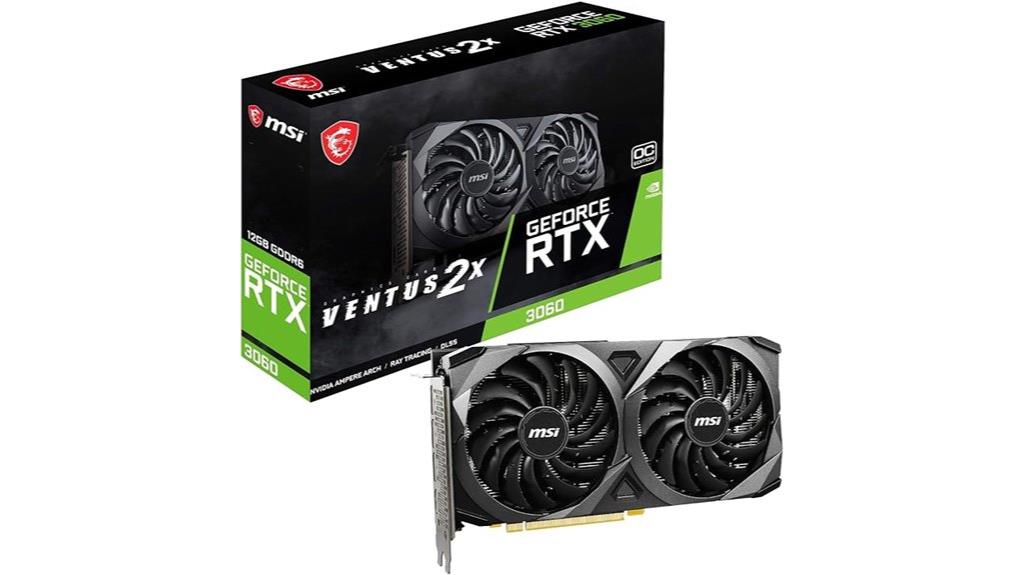
Are you looking for a reliable graphics card that strikes the perfect balance between performance and affordability for your gaming rig? The MSI GeForce RTX 3060 12GB is an excellent choice. It uses NVIDIA’s second-generation Ampere architecture, offering a 1710 MHz GPU clock and 1807 MHz memory clock. With 12 GB of GDDR6 VRAM and multiple display outputs, it handles 1080p and 1440p gaming smoothly. Its dual-fan cooling keeps temperatures down, ensuring quiet operation and longevity. Easy to install and compatible with most mid-tower cases, this card delivers solid performance for gaming, creative work, and future-proofing your build at a reasonable price point.
Best For: gamers, content creators, and AI enthusiasts seeking reliable performance and high VRAM capacity at an affordable price.
Pros:
- Excellent performance for 1080p and 1440p gaming with smooth frame rates
- Quiet operation and efficient dual-fan cooling system for thermal stability
- High-quality build and compatibility with most mid-tower cases
Cons:
- Requires a robust power supply of at least 550W for optimal performance
- Does not support G-Sync technology
- Limited to 12GB VRAM, which may be less future-proof compared to higher-end models
ASUS TUF Gaming GeForce RTX 5070 Ti 16GB Graphics Card
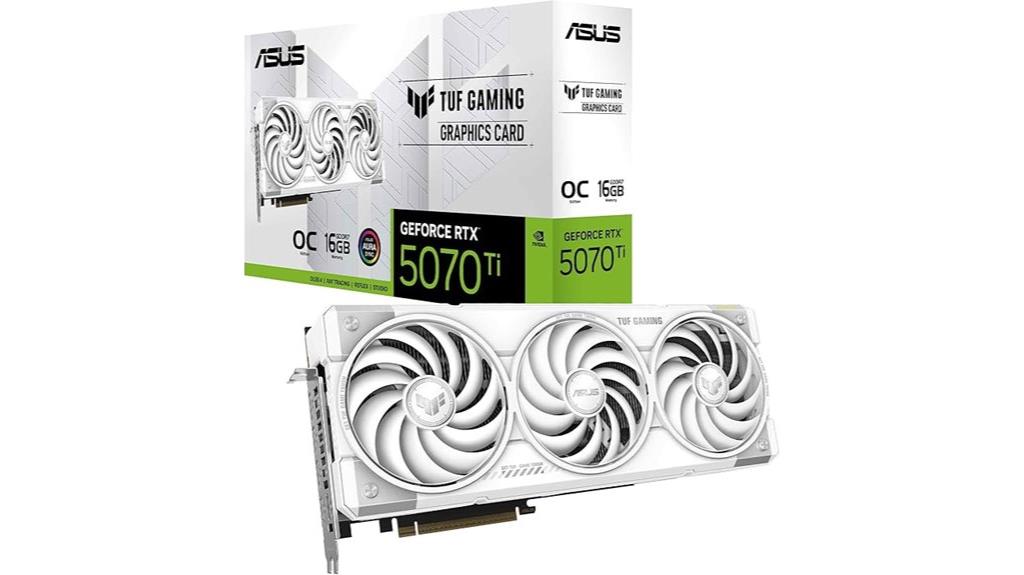
The ASUS TUF Gaming GeForce RTX 5070 Ti 16GB Graphics Card stands out as an excellent choice for serious gamers who demand top-tier performance and durability. It features a PCIe 5.0 interface, HDMI and DisplayPort 2.1 outputs, and a robust 3.125-slot design. Powered by NVIDIA’s Blackwell architecture, it delivers impressive AI performance at 1484 TOPS, with OC mode boosting clocks to 2610 MHz. Built with military-grade components and a phase-change thermal pad, it guarantees longevity and superior thermal management. Axial-tech fans and a fin array optimize airflow, while a protective PCB coating enhances reliability against moisture, dust, and debris.
Best For: gamers and enthusiasts seeking high-performance, durable graphics for demanding AAA titles and AI-enhanced gaming experiences.
Pros:
- Exceptional AI performance with 1484 TOPS and OC mode boosting up to 2610 MHz
- Built with military-grade components ensuring long-term durability and reliability
- Advanced thermal management with axial-tech fans and phase-change thermal pad for efficient cooling
Cons:
- Large 3.125-slot design may require a spacious PC case
- Premium features and build quality may come with a higher price point
- Heavier weight due to robust construction could impact installation and handling
GIGABYTE GeForce RTX 3060 Gaming OC 12G Graphics Card
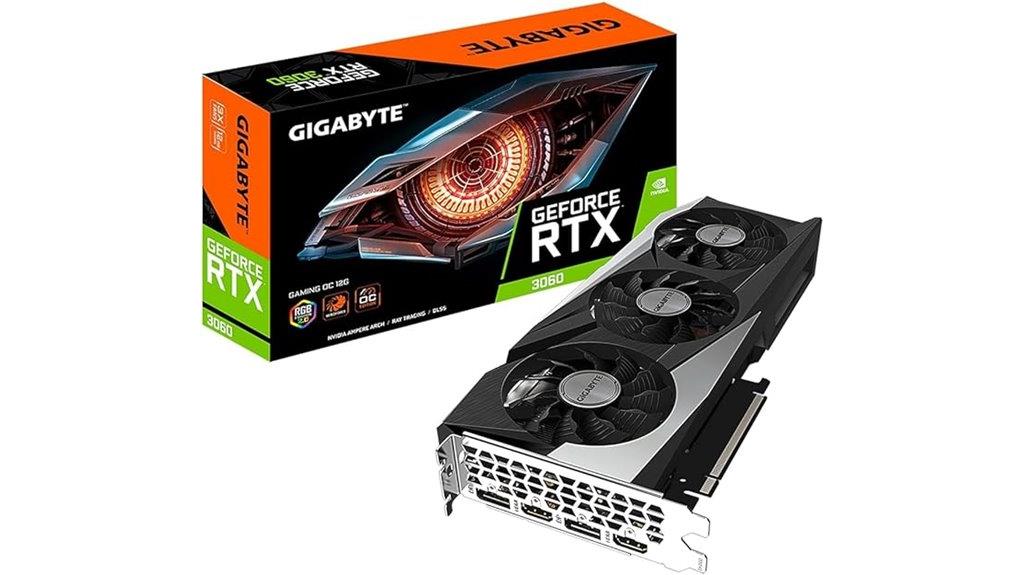
If you’re building a gaming rig on a budget, the GIGABYTE GeForce RTX 3060 Gaming OC 12G stands out as a solid choice thanks to its 12GB of GDDR6 VRAM and advanced Ampere architecture. It features a core clock of 1837 MHz, supporting high resolutions up to 7680×4320, with enhanced ray tracing and AI capabilities. The WINDFORCE 3X cooling system keeps temperatures below 75°C, ensuring quiet operation. Suitable for 1080p and 1440p gaming, it delivers strong frame rates and visual quality. Priced around $320, it offers excellent value for gamers seeking reliable performance, easy installation, and compatibility with most systems.
Best For: budget-conscious gamers and creative users seeking reliable 1080p or 1440p performance with high-quality visuals and easy system compatibility.
Pros:
- Affordable price point around $320 with great value
- Quiet operation with effective cooling at temperatures below 75°C
- Easy to install and compatible with most existing systems requiring 6+2 or 8-pin power connectors
Cons:
- Struggles with DirectX 12 API performance in some applications
- Runs hot during intensive gaming sessions, which may require additional cooling considerations
- Lower performance compared to higher-tier GPUs, limiting 4K gaming potential
Radeon RX 580 8GB Graphics Card
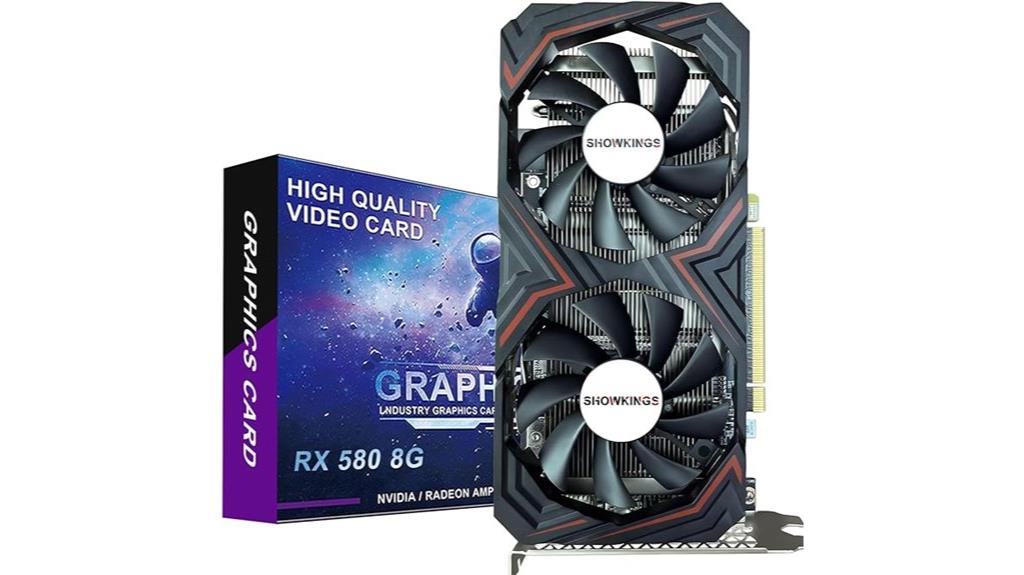
The Radeon RX 580 8GB Graphics Card stands out as an excellent choice for mainstream gamers seeking smooth, high-quality performance without breaking the bank. Built on a 14 nm process, it features 2048 Stream Processors and 8GB GDDR5 memory running at 1750 MHz. It supports up to 4K resolution and multi-monitor setups through HDMI, DisplayPort, and DVI outputs. The card’s dual cooling fans with composite heat pipes ensure efficient cooling, while its durable electrical components guarantee stability during intense gaming sessions. Perfect for gaming, work, or creative tasks, the RX 580 offers versatile performance at an attractive price point, making it a reliable upgrade for any mid-range build.
Best For: gamers, creative professionals, and multi-taskers seeking reliable, high-quality graphics performance at an affordable price.
Pros:
- Supports high-resolution gaming up to 4K with multiple monitor setups
- Efficient cooling system with dual fans and composite heat pipes
- Durable electrical components ensure stability during intensive use
Cons:
- Dimensions may require checking for compatibility with smaller cases
- Requires driver management, including uninstallation of old drivers before installation
- Designed for mainstream gaming, may not meet the needs of high-end, ultra-settings gamers
XFX Radeon RX 580 GTS XXX Edition Graphics Card (RX-580P8DFD6)
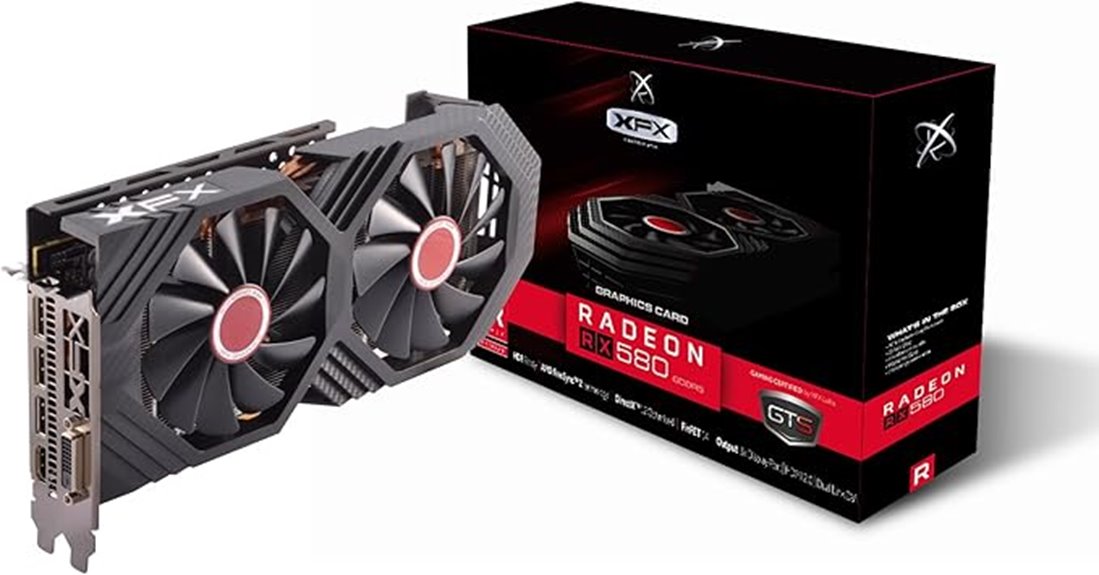
For gamers seeking a reliable and high-performance graphics card, the XFX Radeon RX 580 GTS XXX Edition stands out thanks to its robust Polaris architecture and 8GB of GDDR5 memory. It features factory-overclocked speeds, reaching a true clock of 1366 MHz and boosting to 1386 MHz, with dual BIOS options optimized for gaming and mining. Its cooling system, including a high-efficiency heatsink and heat pipes, guarantees effective thermal management, while Radeon Chill technology helps conserve power and extend GPU life. Supporting VR, multiple display outputs, and built for durability, this card offers solid performance for 1080p gaming and decent 1440p capabilities at an attractive price point.
Best For: gamers seeking a reliable, high-performance graphics card for 1080p gaming and VR experiences at an affordable price.
Pros:
- Factory-overclocked speeds deliver strong gaming performance
- Effective cooling system with high-efficiency heatsink and heat pipes
- Supports VR and multiple display outputs for versatile setups
Cons:
- Limited performance at 1440p gaming without adjustments
- Some reports of bent PCBs affecting durability
- Requires a minimum of 500W power supply, which may be higher than some systems’ capacity
GIGABYTE 2GB RAM DDR3 SDRAM Video Graphics Cards GV-N710D3-2GL REV2.0
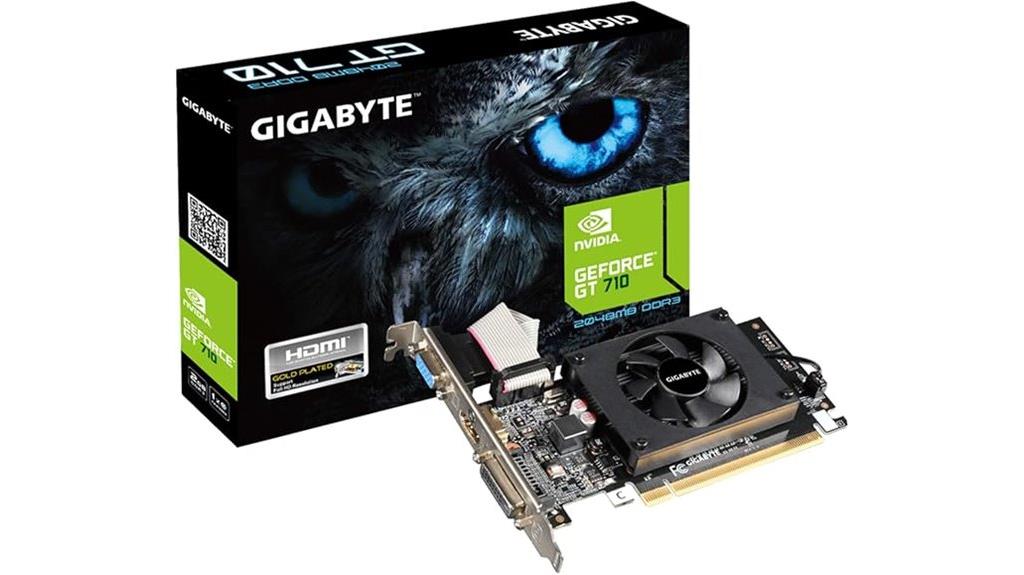
GIGABYTE’s GV-N710D3-2GL REV2.0 stands out as an ideal choice for those building a compact or budget-friendly gaming rig focused on everyday tasks and basic multimedia use. This low-profile card features 2GB DDR3 SDRAM and an NVIDIA GeForce GT 710 chipset, with a core clock of 954 MHz. Its outputs include dual-link DVI-D, D-Sub, and HDMI, supporting up to 4096×2160 resolution. Weighing just 6.7 ounces, it’s easy to install in small systems. While not suited for gaming, it’s perfect for multi-monitor setups, media playback, and upgrading older PCs, offering a reliable, straightforward solution at an affordable price point.
Best For: users seeking an affordable, compact graphics solution for everyday tasks, multi-monitor setups, and media playback in non-gaming systems.
Pros:
- Easy to install and compatible with various Windows versions including Windows 10 and 11
- Supports high resolutions up to 4096×2160 for multimedia and multi-monitor use
- Lightweight and low profile, ideal for small or space-constrained cases
Cons:
- Not suitable for gaming or graphics-intensive applications due to limited processing power and GDDR3 memory
- Potential compatibility issues with PCIe x8 slots that may limit bandwidth performance
- Driver stability can vary; some users may need to revert to older versions for optimal performance
RX 550 4GB Graphics Card with HDMI/DVI for Gaming PC
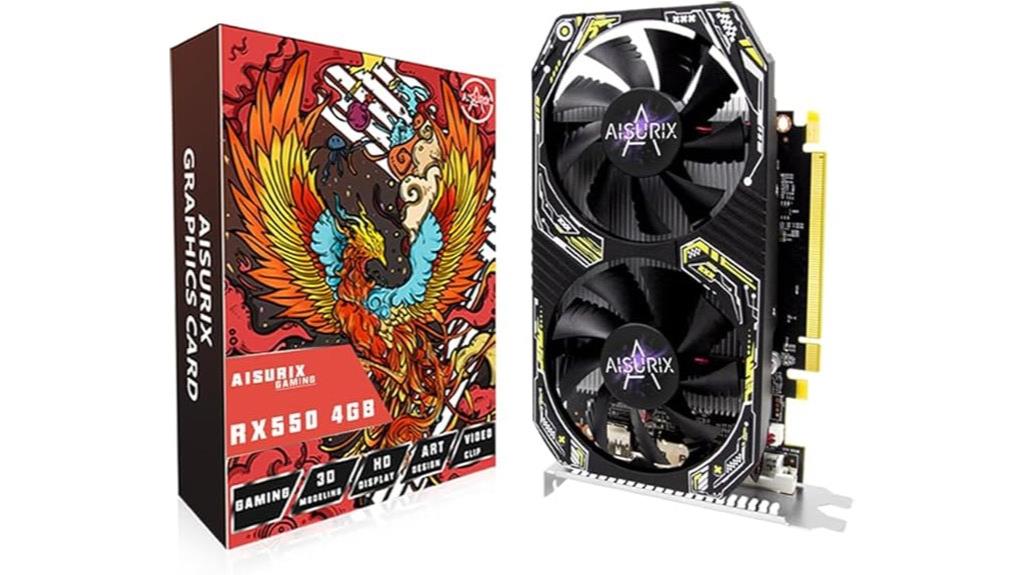
If you’re building a compact gaming PC or upgrading an existing setup without breaking the bank, the RX 550 4GB Graphics Card with HDMI/DVI is an excellent choice. It features 4GB of GDDR5 memory, supports DirectX 12, and connects via a PCIe 3.0 x8 slot. Designed for casual gaming and multi-monitor setups, it offers smooth performance with 512 stream processors. Its low power draw—just 50W—means no external power is needed. Plus, its small size and cooling fan make installation easy in compact cases. Perfect for office work, light gaming, or stock market monitoring, this card delivers reliable, efficient performance at an affordable price.
Best For: casual gamers, small-form-factor PC builders, and users seeking affordable multi-monitor setups for office or stock market monitoring.
Pros:
- Low power consumption (max 50W) with no external power needed
- Compact size suitable for small or slim cases
- Supports multiple displays with HDMI, DVI, and DisplayPort
Cons:
- Designed for non-intensive gaming; may struggle with high-end graphics applications
- Limited to 512 stream processors, reducing performance for demanding tasks
- No external power connector, which might limit overclocking or future upgrades
ASUS TUF Gaming GeForce RTX 5080 16GB Graphics Card
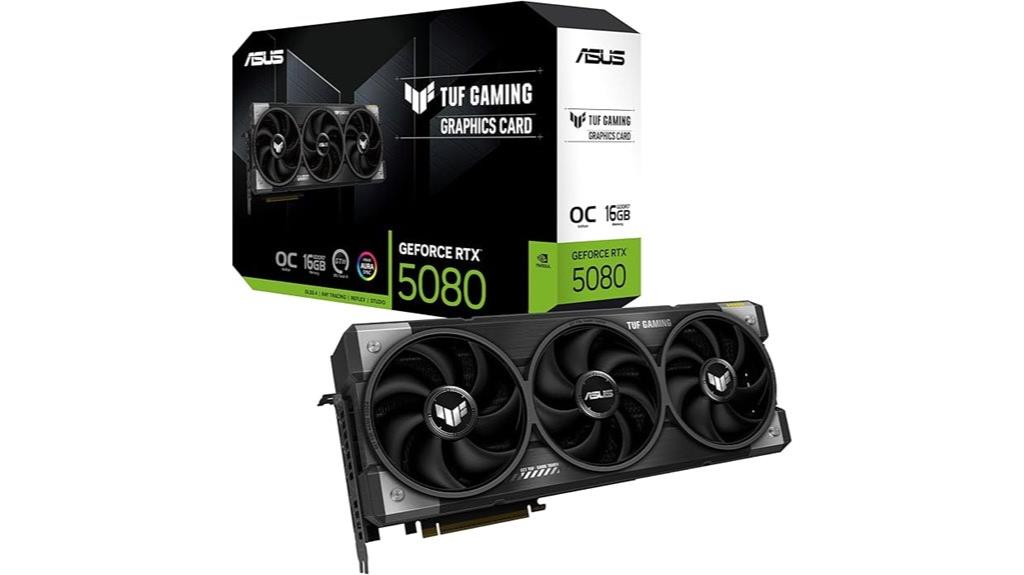
The ASUS TUF Gaming GeForce RTX 5080 16GB graphics card stands out as an ideal choice for serious gamers and creative professionals who demand top-tier performance and durability. Built on NVIDIA’s Blackwell architecture, it features advanced cooling with vapor chambers and axial-tech fans, ensuring thermal efficiency during intense tasks. Its rugged design, military-grade components, and protective coating make it reliable in harsh environments. With 16GB of fast VRAM, support for PCIe 5.0, and features like DLSS 4 and ray tracing, it delivers exceptional 4K gaming, creative workflows, and AI workloads. Priced around $1600, it’s a premium investment for those seeking power, performance, and longevity.
Best For: high-end gamers, creative professionals, and AI developers seeking top-tier performance, durability, and advanced cooling in a premium graphics card.
Pros:
- Exceptional 4K gaming performance with high FPS and smooth visuals
- Robust build quality with military-grade components and advanced cooling systems
- Supports latest technologies like PCIe 5.0, DLSS 4, and ray tracing for enhanced graphics and AI workloads
Cons:
- High price point around $1600, which may be cost-prohibitive for some users
- Large and heavy design requiring spacious case and sturdy support setup
- Occasional manufacturing issues such as bent fins, though generally non-impactful
MSI GeForce GT 710 2GB Graphics Card
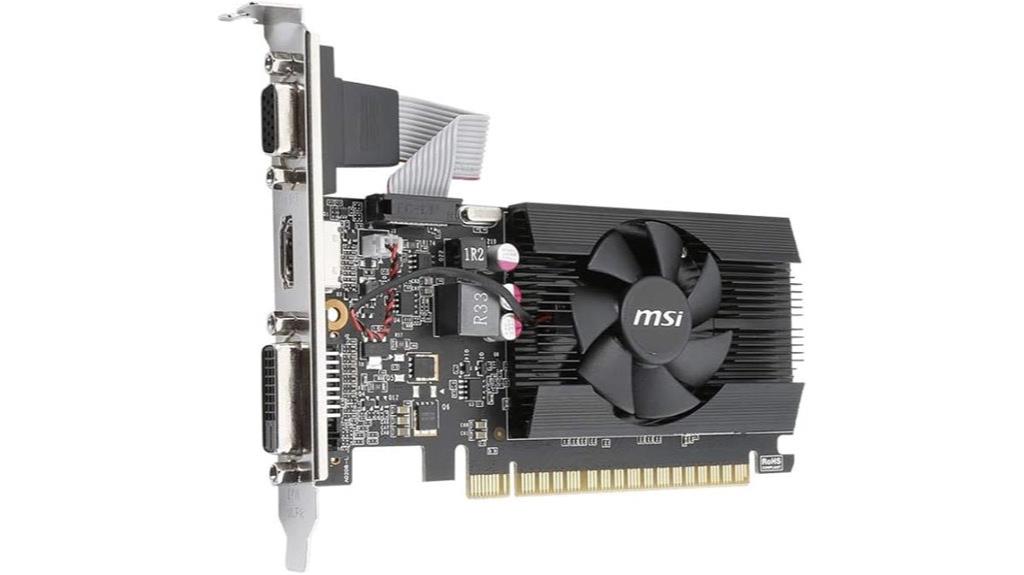
For budget-conscious users upgrading older desktops, the MSI GeForce GT 710 2GB Graphics Card offers a reliable upgrade with solid performance for everyday tasks. It features NVIDIA’s GT 710 chipset and 2GB DDR3 memory, supporting up to two displays with resolutions up to 4096 x 2160. Its low profile design makes it ideal for small form factor systems. While not suited for gaming, it substantially boosts performance over integrated graphics, handling media, basic applications, and multi-monitor setups smoothly. Although installation can be tricky and driver updates are necessary, many users find it a cost-effective choice for enhancing older systems without breaking the bank.
Best For: budget-conscious users upgrading older desktops who need reliable basic performance for media, multi-monitor setups, and everyday tasks.
Pros:
- Affordable upgrade option that significantly boosts performance over integrated graphics
- Supports up to two displays and high resolutions up to 4096 x 2160, ideal for multi-monitor setups
- Low profile design suitable for small form factor systems and space-limited builds
Cons:
- Installation can be challenging for first-time users, often requiring BIOS updates and driver downloads
- Not suitable for gaming or high-performance graphics tasks
- Requires a 300W power supply and may have limited driver support without updates
PowerColor Hellhound Spectral White AMD Radeon RX 9060 XT 16GB GDDR6 Graphics Card
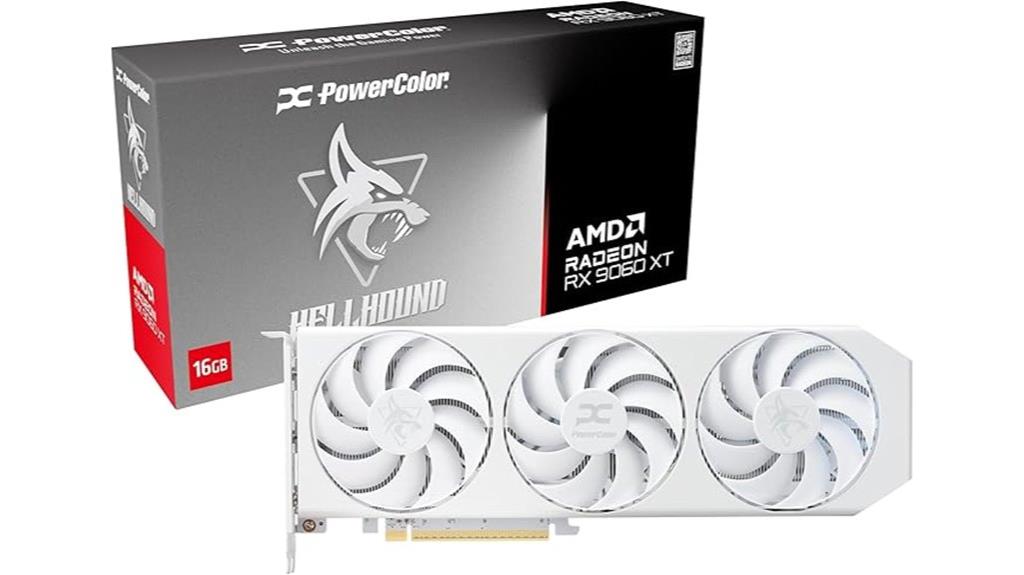
The PowerColor Hellhound Spectral White AMD Radeon RX 9060 XT 16GB GDDR6 Graphics Card stands out as an excellent choice for gamers seeking high-performance 4K gaming without breaking the bank. It features an AMD Radeon RX 9060 XT coprocessor, 16GB of GDDR6 memory at 20 GHz, and supports resolutions up to 7680×4320. Designed to fit most mid-sized cases, it offers quiet operation and strong thermals, thanks to factory overclocking. With a power draw of just one 8-pin connector and compatibility with Linux and eGPU setups, it delivers high frame rates in demanding titles like Cyberpunk 2077 and Halo Infinite, making it a versatile, reliable option.
Best For: gamers and content creators seeking high-performance 4K gaming, efficient thermals, and compatibility with Linux and eGPU setups in a mid-range priced graphics card.
Pros:
- Excellent 4K performance with high frame rates in demanding titles like Cyberpunk 2077 and Halo Infinite
- Quiet operation and strong thermal management, even under extended loads
- Supports open-source drivers, runs well on Linux, and is compatible with eGPU configurations via Thunderbolt 3
Cons:
- Slightly higher power requirements with a single 8-pin connector may limit some system upgrades
- Ray tracing performance is limited compared to higher-end cards
- Market prices can vary significantly, sometimes exceeding typical mid-range budgets
RX 580 8GB Graphics Card for Gaming PC
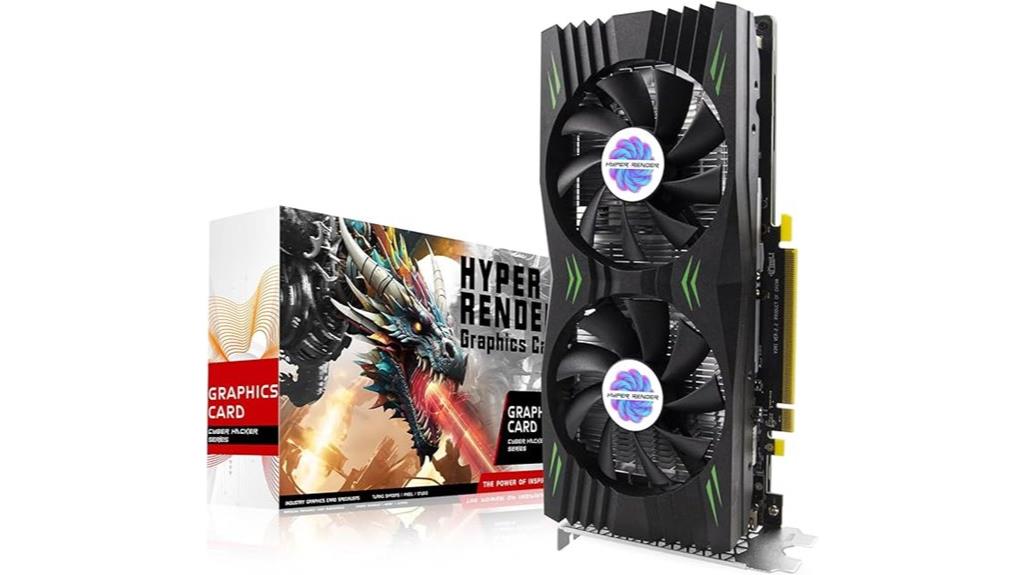
If you’re building a gaming rig that demands smooth performance without breaking the bank, the RX 580 8GB graphics card is a solid choice. Built on 14nm architecture, it features 2048 stream processors and 8GB GDDR5 memory at 1750 MHz, delivering excellent performance on recent AAA titles. It supports up to two displays via HDMI and DisplayPort, ensuring crisp visuals and multitasking. Its HyperRender cooling system with dual fans and smart fan control keeps temperatures in check while reducing noise. Overall, the RX 580 offers high frame rates, vivid colors, and reliable operation, making it a versatile option for gamers seeking quality performance at an affordable price.
Best For: gamers seeking a cost-effective graphics card that delivers smooth performance and high-quality visuals for recent AAA titles.
Pros:
- Excellent performance on latest AAA games with high frame rates
- Efficient HyperRender cooling system reduces noise and maintains optimal temperatures
- Supports multi-monitor setups with HDMI and DisplayPort outputs
Cons:
- Mid-range GPU may struggle with very high settings in future demanding titles
- Limited to two display outputs, which might not suit multi-monitor users
- Built on 14nm architecture, which is less power-efficient compared to newer generations
PNY NVIDIA GeForce RTX™ 5050 Dual Fan Graphics Card (8GB GDDR6)
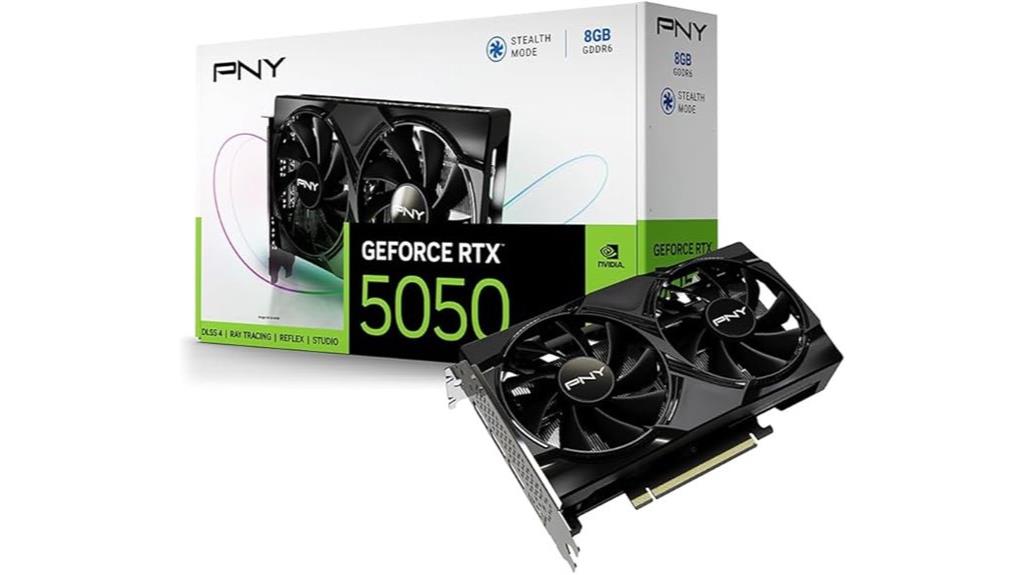
The PNY NVIDIA GeForce RTX™ 5050 Dual Fan Graphics Card stands out as an excellent choice for compact gaming rigs that demand high performance without sacrificing space. Its NVIDIA Blackwell architecture combines advanced Ray Tracing and Tensor Cores, delivering enhanced AI capabilities and smooth visuals. With 8GB GDDR6 memory and PCIe® 5.0 support, it handles high-resolution gaming up to 7680×4320 effortlessly. The dual-fan cooling ensures efficient heat management in small form factor setups. Perfect for gamers and creators alike, this card offers impressive power, cutting-edge features like DLSS 4, and reliable stability, all packed into a compact design.
Best For: gamers and content creators seeking a compact, high-performance graphics card capable of handling 4K gaming and demanding creative workflows.
Pros:
- Compact design ideal for small form factor builds
- Supports high-resolution gaming up to 7680×4320 with advanced Ray Tracing and DLSS 4
- Reliable performance with 8GB GDDR6 memory and PCIe® 5.0 support
Cons:
- Limited to 8GB GDDR6, which may be insufficient for ultra-heavy workloads in the future
- Slightly higher price point due to advanced features and compact design
- Compatibility may require a PCIe® 5.0 slot and sufficient power supply in some systems
Factors to Consider When Choosing Premium Graphics Cards for Gaming Rigs
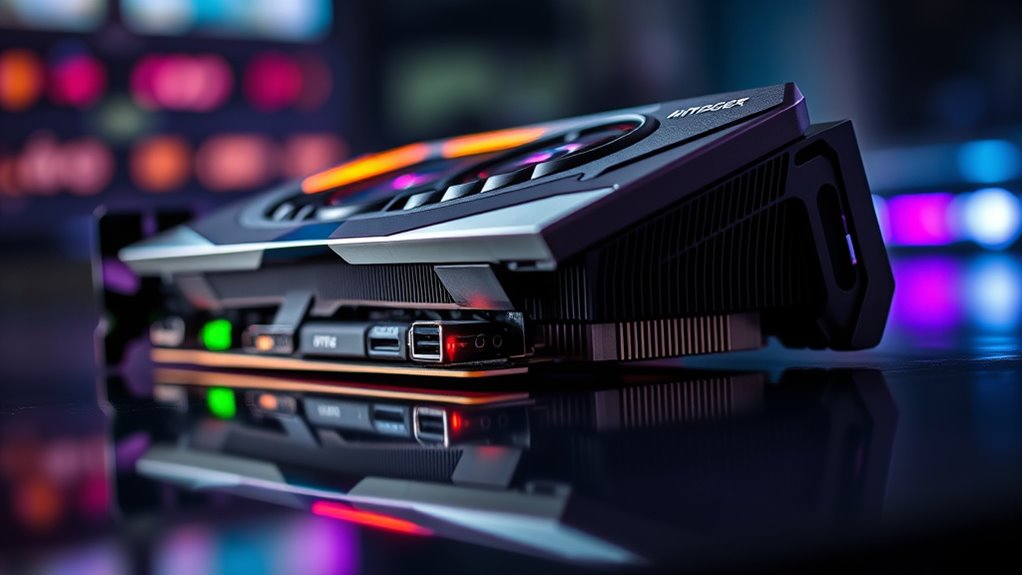
When selecting a premium graphics card, I focus on performance benchmarks to guarantee it meets my gaming needs. Compatibility requirements, cooling solutions, and power supply needs are also vital to keep everything running smoothly. Finally, build quality plays a key role in durability and long-term reliability.
Performance Benchmarks
Performance benchmarks are vital for evaluating how well a graphics card will handle gaming demands, as they provide measurable data on key capabilities like frame rates, latency, and rendering speed. These benchmarks, such as 3DMark or Unigine Heaven, give quantitative comparisons across models, helping you gauge overall performance. When I look at real-world gaming results, I focus on average FPS in popular titles at various settings and resolutions to see how a card performs in actual gameplay. Synthetic benchmarks simulate demanding workloads like ray tracing or high-resolution rendering, predicting performance under intense tasks. Consistent benchmark results across multiple tests and reviews are fundamental—they confirm a card’s ability to meet specific gaming expectations, ensuring you get the power and performance you need for an ideal gaming experience.
Compatibility Requirements
Choosing the right premium graphics card involves carefully considering compatibility factors to guarantee smooth integration with your existing system. First, check that your motherboard’s PCIe slot supports the card’s version, like PCIe 4.0 or 5.0, for peak performance. Next, verify that your power supply can deliver enough wattage and has the correct connectors, such as 8-pin or 12-pin, to meet the card’s power needs. Also, measure your case’s available space to ensure the card fits, especially for larger, triple-slot designs. Confirm that your motherboard has the necessary output ports, like DisplayPort or HDMI, matching your monitor. Finally, update your BIOS firmware to support new graphics cards and avoid potential compatibility or boot issues.
Cooling Solutions
Selecting the right cooling solution is essential for keeping your high-end graphics card running smoothly during intense gaming sessions. Effective cooling methods like axial-tech fans, vapor chambers, and thermal pads help maintain ideal GPU temperatures under heavy loads. High-performance cards often feature multiple fans with optimized airflow designs to enhance heat dissipation and minimize noise. Advanced systems may include heat pipes, phase-change thermal pads, and large fin arrays, which improve thermal transfer and prevent overheating. Proper thermal management not only extends your GPU’s lifespan but also ensures stable performance and allows for safe overclocking. Additionally, cooling solutions that prioritize quiet operation contribute to a more immersive gaming experience by reducing distracting fan noise, helping you stay focused during critical gameplay moments.
Power Supply Needs
When building a gaming rig with a high-end graphics card, ensuring your power supply can handle the load is essential. Most premium GPUs demand at least 650W to 850W capacity, depending on their power draw. They also typically require one or two 8-pin or 6-pin PCIe connectors for ideal performance. Using an underpowered supply can cause system instability, crashes, or failure to boot. To avoid these issues, choose a quality power supply with at least an 80 Plus Gold certification, which guarantees stable power delivery and reduces thermal stress. It’s also important to verify that your power supply has enough connectors and headroom for overclocking and future upgrades, ensuring your system stays reliable and efficient.
Build Quality
High-quality graphics cards are built to last, and their durability depends on the materials and construction standards used during manufacturing. Premium models often incorporate military-grade components and protective coatings to withstand thermal stress and environmental factors, ensuring longevity. Reinforced backplates and high-grade solder joints add structural strength, reducing the risk of damage over time. Precise manufacturing standards guarantee tight tolerances and minimal defects, which is essential for reliable performance. Good build quality also promotes effective heat dissipation, utilizing advanced cooling solutions like vapor chambers and reinforced fans to maintain stable operation under load. A sturdy construction not only enhances durability but also protects against physical damage during installation, transport, or extended use, ensuring consistent performance for years to come.
Price & Availability
The cost and availability of premium graphics cards substantially influence your options when building a gaming rig. Prices can range from around $320 for mid-range options to over $1600 for top-tier models, making budget considerations vital. Supply constraints and high demand often lead to limited stock, delayed shipments, and increased prices, especially during new launches or shortages. Many high-end GPUs are frequently sold out or require waiting lists, which can be frustrating if you’re enthusiastic to upgrade. Online retailers and manufacturer websites often have different stock levels and prices, so comparing sources is essential to get the best deal. Being flexible and patient can help you navigate these market fluctuations and secure a premium GPU that fits your budget and timeline.
Future-Proofing Features
Future-proofing a graphics card means selecting features that keep it relevant as technology advances. I look for support for the latest interfaces like PCIe 5.0, which offers faster data transfer and increased bandwidth, guaranteeing longevity. High VRAM, such as 16GB or more, helps handle future game textures and creative tasks without bottlenecks. Compatibility with advanced display technologies like HDMI 2.1 and DisplayPort 2.1 allows for higher resolutions and refresh rates on upcoming monitors. Support for AI-driven features like DLSS 4 and ray tracing ensures the card stays relevant as rendering techniques improve. Additionally, a robust architecture like NVIDIA Blackwell or AMD RDNA 3 provides better performance efficiency and feature sets, extending the GPU’s lifespan and keeping my system future-ready.
Aesthetic & Design
You are trained on data up to October 2023. When choosing a premium graphics card, aesthetic and design matter just as much as performance. Elements like RGB lighting, color schemes, and sleek finishes can make your rig stand out visually. The size and form factor should match your case’s dimensions and airflow setup, guaranteeing ideal cooling and fit. Unique features such as customizable backplates and dual-fan configurations not only enhance the look but also improve cooling efficiency. The overall style—whether minimalist, aggressive, or futuristic—should complement your build’s theme. A well-designed GPU can serve as a centerpiece, elevating your gaming setup’s visual cohesion and prestige. Prioritizing aesthetics ensures your rig looks as impressive as it performs.
Frequently Asked Questions
How Do Cooling Solutions Impact High-End Graphics Card Performance?
Cooling solutions are essential for high-end graphics cards because they directly impact performance. When a card stays cool, it can run at higher clock speeds without throttling, giving me smoother gameplay and better frame rates. Good cooling also prolongs the lifespan of the GPU by preventing overheating. I always look for efficient cooling, like liquid or large heatsinks, to keep my graphics card performing at its best during intense gaming sessions.
Are There Specific Power Supply Requirements for Premium GPUS?
Yes, premium GPUs usually need powerful power supplies. I recommend at least a 750W unit for high-end cards, but some might require up to 850W or more, especially if you’re overclocking. It is crucial to check the specific GPU’s power recommendations and verify your PSU has the right connectors, like 8-pin or 12-pin. A reliable, high-capacity PSU helps your GPU perform at its best without stability issues.
What Are the Compatibility Considerations for Multiple GPU Setups?
When setting up multiple GPUs, I always check if my motherboard supports SLI or CrossFire technology, depending on the brand. I make sure my power supply can handle the combined wattage, including extra connectors. Adequate spacing between cards is vital for airflow, so I verify the case’s size and PCIe slot availability. Compatibility also means updating BIOS and drivers to optimize multi-GPU performance.
How Does Driver Support Influence Long-Term Graphics Card Performance?
Driver support plays a huge role in long-term graphics card performance. When drivers are regularly updated, they fix bugs, improve stability, and optimize performance for new games and software. I always make sure my GPU drivers are current because outdated drivers can cause crashes, lower frame rates, or compatibility issues down the line. Good driver support guarantees my graphics card runs smoothly and stays relevant as technology evolves.
Can Premium Graphics Cards Be Overclocked Safely for Extra Performance?
Think of overclocking like pushing a sports car to its limits—you can get extra speed, but risks are involved. Yes, premium graphics cards can be overclocked safely if you’re careful. I always recommend gradual tweaks, monitoring temps, and ensuring good cooling. With patience, you’ll squeeze more performance without sacrificing longevity. Just remember, a cautious approach lets you enjoy the boost without turning your GPU into a fiery mess.
Conclusion
Choosing the right premium graphics card can elevate your gaming experience to legendary heights—think of it as wielding Excalibur in today’s digital domain. Whether you’re eyeing the latest RTX models or solid Radeon options, I’ve seen how a great card transforms gameplay. Just remember, in a world of ever-advancing tech, staying informed is your key. So, equip yourself wisely and prepare for adventures that even King Arthur would envy!









